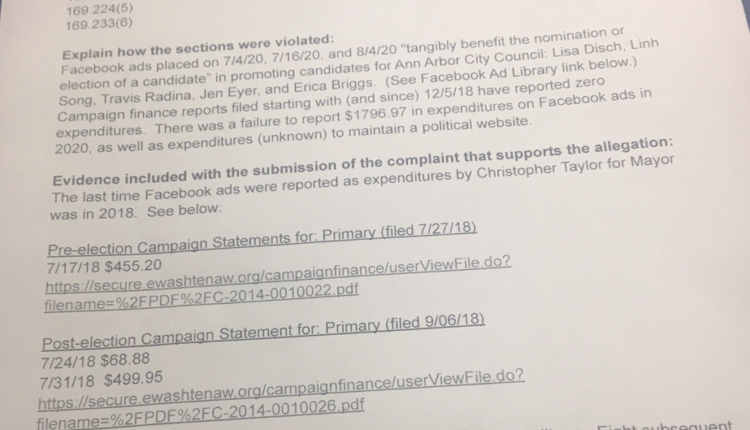Campaign Finance Violation Complaint Filed Against City Council Member
The Michigan Secretary of State’s Bureau of Elections is investigating a campaign finance violation complaint filed against Mayor Christopher Taylor in March of this year. The complaint alleges that Taylor, a Democrat who has served on City Council since 2009, violated three sections of Michigan’s Campaign Finance Act: 169.221a(2)d, 169.224(5) and 169.233(6). The complaint states, “There was a failure to report $1,796.97 in expenditures on Facebook ads in 2020, as well as expenditures (unknown) to maintain a political website.” Taylor is a partner in the local law firm Hooper Hathaway.
The complaint to the Secretary of State’s office includes evidence from both Taylor’s campaign finance forms filed with the Washtenaw County Clerk’s office, as well as Facebook ad data provided to the public.
The alleged omissions were brought to the attention of County Clerk Larry Kestenbaum. However, the County Clerk’s office is not the investigatory body responsible.

“The last time Facebook ads were reported as expenditures by Christopher Taylor for Mayor was 2018,” the complaint states.
The complaint includes links to three campaign finance statements that disclose Facebook ad expenditures made by Taylor’s campaign in July of 2018, totaling $1,024.03. The complaint goes on to point out that “eight subsequent [campaign finance] statements report zero Facebook ad expenditures for ‘Christopher Taylor for Mayor.'” Those statements were filed by Taylor between October 2018 and January 2021. However, during that time (5/7/18-3/17/21), the complaint states, “Facebook ad library reports a total of $2,821 in expenditures by ‘Christopher Taylor for Mayor.” The complaint gives dates between 8/1/18 and 8/18/20 on which Taylor paid for a total of 14 Facebook ads, listing his “Christopher Taylor for Mayor” as the source of the ads.
A trio of 2020 Facebook ads mentioned in the complaint were ones that promoted the election of candidates. The complaint states that sections 169.221a(2)d, 169.224(5) and 169.233(6) of the Michigan Campaign Finance Act were violated by Taylor to “tangibly benefit the nomination or election of a candidate in promoting candidates for Ann Arbor City Council: Lisa Disch, Linh Song, Travis Radina, Jen Eyer and Erica Briggs.”
The complaint further states that Taylor’s campaign finance forms fail to disclose “other additional expenses [that] should be reported, such as [the] cost of maintaining the website for Christopher Taylor for Mayor.”
According to the non-profit, non-partisan Michigan Campaign Finance Network, in 2017 half of Michigan’s state representatives had been fined for campaign finance violations. When the MCFN drilled down into the data, however, the bulk of the fees had been paid by fewer than a dozen Michigan lawmakers. The list included current Democratic House Leader, 52nd District Rep. Donna Lasinski, a one-time member of the Ann Arbor Board of Education who resigned her seat to run for state office.
The Michigan Bureau of Elections oversees the investigation of Campaign Finance complaints and the imposition of penalties.
The Elections Bureau will give Taylor the opportunity to respond to the citizen complaint and bring his record keeping into compliance. Taylor’s most recent campaign finance statements lists former County Commissioner/DDA Board member Leah Gunn as his campaign treasurer. According to Section 22 of the Michigan Campaign Finance Act, “A treasurer or other individual designated as responsible for the committee’s record keeping, report preparation, or report filing who knowingly violates this section is subject to a civil fine of not more than $1,000.00.”
In Washtenaw County, records show that those who have failed to keep campaign finance records up-to-date in 2020 include a former Council member, Council candidates, PACs, a WCC Trustee candidate and several Board of Education candidates.


Sometimes how money is spent is more telling than how it was received, which is why these laws exist. Imagine if candidates were allowed to spend large sums of money on dubious expenses with no detail given, or no expense report created at all. If a candidate gives a large sum of money to an individual for under-described or un-described services where is that money really going?
Failure to report ‘expenses’? I’d think something was up with failure to report income as in ‘donors’, but ‘expenses’? Seems like a valid clerical error to me.
He spent money supporting candidates for council and then did not report it on his campaign finance, that is why the report was filed in Lansing.